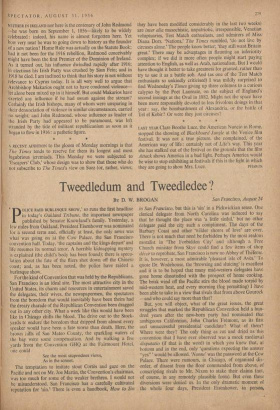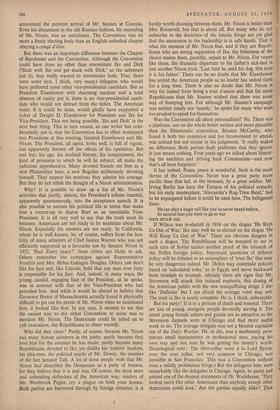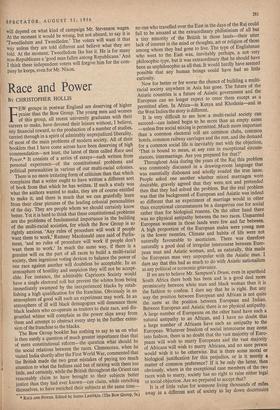Tweedledum and Tweedledee ?
BY D. W. BROGAN San Francisco, August 24 OLICE RAID BURLESQUE SHOW,' SO runs the first headline in today's Oakland Tribune, the important newspaper published by Senator Knowland's family. Yesterday, a Few miles from Oakland, Presidentlisenhower was nominated For a second term and, officially at least, the only news was what was going on at the Cow Palace. the San Francisco convention hull. Today, 'the captains and the kings depart' and life resumes its normal tenor. A horrible kidnapping mystery is explained (the child's body has been found); there is specti- lation about the fate of the fliers shot down off the Chinese coast; and, as has • been noted, the police have raided a burlesque show. in San Francisco, but this is 'sin' in a Pickwickian sense. One clerical delegate from North Carolina was induced to say that he thought the place was 'a little sinful,' but no other delegate paid the city such a compliment. The days of the Barbary Coast and other 'Wilder shores of love' are over. There is not much that need be forbidden by the most zealous moralist in 'The Forbidden City' and although a Free Church minister from Skye could find a few items of shop decor to reprobate, San Francisco is now no Abbey of Theleme. It is, however, a most admirable 'pleasant isle of Ayes.' To quote Dr. Wodehouse, the 'browsing and sluicing' is excellent and it is to be hoped that many mid-western delegates have gone home dissatisfied with the prospect of home cooking. The brisk wind off the Pacific stirs the blood made torpid by mid-western heat, and every morning (fog permitting) I have been able to take in a view that rivals that from above Gourock —and who could say more than that? announced the penitent arrival of Mr. Stassen at Canossa. Even his abasement in the old Russian fashion, his seconding of Mr. Nixon, was an anticlimax. The Convention was no more a freely electing body than an English cathedral chapter obeying a conge d'elire.
But there was an important difference between the Chapter of Barchester and the Convention. Although the Convention could have done no other than renominate Ike and Dick (`Stick with Ike and get stuck with Dick,' as the saboteurs put it), they really wanted to renominate both. True, there were some (not. I think, very many) delegates who would have preferred some other vice-presidential candidate. But as President Eisenhower with charming candour and a total absence of vanity put it, there is no vice-presidential candi- date who would not detract from the ticket. The American voter, if it could be done, would gladly have supported a ticket of Dwight D. Eisenhower for President and Ike for Vice-President. This not being possible, `lke and Dick' is the next best thing. This in turn means, as one writer has cold- bloodedly put it, that the Convention has in effect nominated two Presidents at this meeting, General Eisenhower and Mr. Nixon. The President, all agree, looks well, is full of vigour, has apparently thrown off the effects of his operation. But and but; his age, his medical history, his temperament, the kind of pressures to which he will be subject, all make the judicious apprehensive. Many devoted friends see him as a new Plutarchian hero, a new Regulus deliberately devoting himself. They respect his motives; they admire his courage. But they do not relish the thought of a Nixon administration.
Why? It is possible to draw up a list of Mr. Nixon's activities that justify, almost, the President's tribute inserted, apparently spontaneously, into the acceptance speech. It is also possible to narrate his political life in terms that make him a runner-up to Aaron Burr as an unsuitable Vice- President. It is all very well to say that the truth must lie between. Americans are not ready to be moderate about Mr. Nixon. Especially his enemies are not ready. In California, where he is well known, he, of course, suffers from the hos- tility of many admirers of Chief Justice Warren who was not efficiently supported as a favourite son by Senator Nixon in 1952. 'Had Zimri peace?' these critics are likely to ask. Others remember the campaigns against Representative Voorhis and Mrs. Helen Gahagan Douglas. Others just don't like his face and, like Lincoln, hold that any man over forty is responsible for his face. And, indeed, in many ways, the young, candid, engaging face of the President, as he spoke, was in contrast with that of the Vice-President who had preceded him. And while it would be absurd to believe that Governor Herter of Massachusetts actually found it physically difficult to get out his praise of Mr. Nixon when he nominated him, it looked like that. In any case, it seemed to me that the easiest way to stir either Convention to noise was to mention Mr. Nixon. The Democrats could be relied on to yell execration, the Republicans to cheer warmly.
Why did they cheer? Partly, of course, because Mr. Nixon has many honest admirers in the party; partly because they love him for the enemies he has made; partly because many Republicans, devoted to Ike, yet dislike his 'eastern' backers, his idea-men, the political pupils of Mr. Dewey, the enemies of the late Senator Taft. A lot of these people wish that Mr. Nixon had described the Democrats as a party of treason, for they believe that it is and was. Of course, the most stern and unbending defenders of the American way, readers of Mr. Westbrook Pegler, cry a plague on both your houses. Both parties are burrowed through by foreign termites; it is hardly worth choosing between them. Mr. Nixon is better than Mrs. Roosevelt, but that is about all. But many who do not subscribe to the doctrines of the lunatic fringe are yet glad that the succession to the leadership is in safe hands. That is what the enemies of Mr. Nixon fear, and if they are Repub- licans who are strong supporters of Ike, the bitterness of the choice makes them, possibly, unjust to Mr. Nixon. For voters like these, the dramatic departure to his father's sick-bed is just another Nixon trick. 'Last time he used his dog, this time it is his father.' There can be no doubt that Mr. Eisenhower has united the American people as no leader has united then' for a long time. There is also no doubt that Mr. Nixon is very far indeed from being a trait d'union and that far more Republicans than Mr. Stassen wished that there was some way of dumping him. For although Mr. Stassen's campaign was neither timely nor leamly,' he spoke for many who were too prudent to speak for themselves.
Was the Convention all about personalities? No. There was a platform, one on the whole better written and more plausible than the Democratic concoction. Senator McCarthy, who found it both too expensive and too inconvenient to attend, was unkind but not unjust in his judgement. 'It really makes no difference. Both parties draft platforms that they ignore. It just means nothing. Four years ago we talked about liberat- ing the satellites and driving back Communism—and now that's all been forgotten.'
It has indeed. Peace, peace is wonderful. Such is the main theme of the Convention. Never was a great party more pacific than that led, at the moment, by a great soldier. Mr. Irving Berlin has been the Tyrteaus of his political crusade, but his early masterpiece, 'Alexander's Rag-Time Band,' had to be expurgated before it could be used here. The belligerent lines: He can play a bugle call like you've never heard before, So natural that you want to go to war were struck out.
If Wilson was re-elected in 1916 on the slogan 'He Kept Us Out of War,' Ike may well be re-elected on the slogan 'He Will Keep Us Out of War.' There are obvious dangers in such a slogan. The Republicans will be tempted to see in each turn of Soilet tactics another proof of the triumph of the Dulles foreign policy. Important questions of defence policy will be debated in an atmosphere of 'trust Ike' that may be very dangerous indeed. Mr. Dulles may undertake policies based on 'calculated risks,' as in Egypt, and move backward from triumph to triumph. Already there are signs that Mr. Stevenson will attack this induced euphoria, this dosing of the American public with the new tranquillising drugs. I dis- like `Dullesite' but I am afraid the average voter may not. The trust in Ike is nearly complete. He is, I think, unbeatable.
But his party? It is in a process of death and renewal. There are lots of young, energetic people devotedly serving it. The smart young female ushers and guides are as attractive as the Stevenson damsels were at Chicago and had more useful work to do. The average delegate was not a bloated capitalist out of the Daily Worker. He, or she, was a moderately pros- Terous small businessman or professional man, paying his own way and not sure he was getting his money's worth. (Sociological note : The shirt-collar worn a la Lord Byron, over the coat collar, not very common in Chicago, was invisible in San Francisco. This was a Convention without even a mildly proletarian fringe.) But the delegates here were remarkably like the delegates in Chicago. Again, to quote and amend one of the deepest statements of Dr. Wodehouse, 'They looked more like other Americans than anybody except other Americans could look.' Are the parties equally alike? That Will depend on what kind of campaign Mr. Stevenson wages. At the moment it would be wrong, but not absurd, to say it is 'Tweedledum and Tweedledee.' The voters will want it that way unless they are told different and believe what they are told. At the moment, Tweedledum Ike has it. He is for many non-Republicans a 'good man fallen among Republicans.' And I think these independent voters will forgive him for the com- pany he keeps, even for Mr. Nixon.




































 Previous page
Previous page